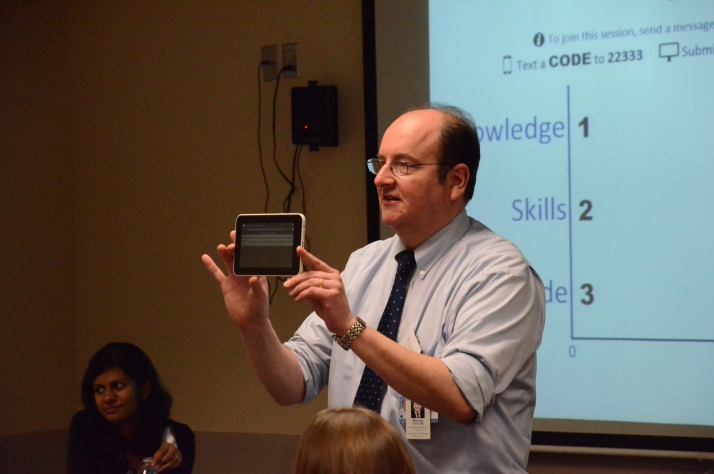AAP Psychiatric Education Award
Association for Academic Psychiatry Selects Michael Travis, MD
for 2014 Psychiatric Education Award
 Congratulations to Michael Travis, MD, on his selection for the 2014 Psychiatric Education Award from the Association for Academic Psychiatry.
Congratulations to Michael Travis, MD, on his selection for the 2014 Psychiatric Education Award from the Association for Academic Psychiatry.
The Psychiatric Education Award recognizes innovative and exemplary psychiatric educators and/or educational programs at the medical school, residency and faculty development levels for their outstanding contributions to educating non-psychiatrists and/or the general public about psychiatry. The Association will present Dr. Travis with the award on September 20, 2014 at its annual meeting in Portland, Oregon. As part of the award, Dr. Travis will present a lecture at the meeting and will receive a cash award.
Since his recruitment by the University of Pittsburgh Department of Psychiatry in 2005, Dr. Travis has played a major role in developing and implementing programming to enhance training experiences for medical students and residents. His contributions to educational programming utilize models developed by him and his colleagues that can be adapted by other institutions seeking to enhance their own educational programming in Psychiatry.
The Academic Administrator Clinician Educator (AACE) Track for psychiatric residents is an excellent example of Dr. Travis' foresight and vision, and serves as a model for other psychiatric residency programs. Launched in 2008, the AACE track is part of an institution-wide movement towards promoting future academic leaders in clinical care, continuing education, and administration. The goal of the track is to provide residents with a better understanding of research fundamentals, teaching methods, quality improvement approaches, and program development and administration. Residents have presented their projects at local and national professional meetings, and collaborated on manuscripts based on their work.
Dr. Travis is also an innovator in the development and implementation of novel teaching methods and training initiatives, and increasing mutual learning opportunities for faculty and trainees. He led an effort to rewrite the United Kingdom edition of the Oxford American Handbook of Psychiatry, a 1,000-page pocket-size resource book designed for easy use in clinical settings. He also oversaw implementation of the annual Objective Structured Clinical Examinations (OSCEs) for residents, which engaged faculty to develop Board-style clinical vignettes, OSCE questions, and the recruitment of standardized patients, and culminating in a one-day exam with up to 26 stations.
 Dr. Travis has energetically employed new technology to enhance instruction and learning. He pioneered the installation of firewall compliant webcams on resident computers to record psychotherapy sessions that are used to enhance the quality of psychotherapy supervision. Through the WPIC Wide Journal Club that he established in 2008, PGY2 residents hone their dissemination skills by presenting a recent peer-reviewed article and participating in a discussion with the audience and a panel of senior faculty experts. Dr. Travis also has utilized Camtasia software to create a permanent but revisable online archive of didactic content and a toolbox of resources for faculty to use to facilitate participatory classroom learning.
Dr. Travis has energetically employed new technology to enhance instruction and learning. He pioneered the installation of firewall compliant webcams on resident computers to record psychotherapy sessions that are used to enhance the quality of psychotherapy supervision. Through the WPIC Wide Journal Club that he established in 2008, PGY2 residents hone their dissemination skills by presenting a recent peer-reviewed article and participating in a discussion with the audience and a panel of senior faculty experts. Dr. Travis also has utilized Camtasia software to create a permanent but revisable online archive of didactic content and a toolbox of resources for faculty to use to facilitate participatory classroom learning.
On a national level, Dr. Travis is active member of several professional organizations and scientific societies, and has served in leadership positions and on committees and councils to guide those organization's activities. He is a dedicated member of the American Association of Directors of Psychiatry Residency Training (AADPRT), serving in numerous capacities including Treasurer, the Region 3 Representative, and as a member of the Association's Steering Committee and Executive Council. He will begin serving as the AADPRT representative to American College of Psychiatrists' Editorial Board for the Psychiatry Resident-In-Training Examination (PRITE®) in August 2014. He also serves on the Program Committee for the Annual Meeting of the Society for Biological Psychiatry.
In addition to his extensive teaching and administrative responsibilities, Dr. Travis has pursued his interest in translational neuroscience in the classroom as well as the laboratory. In addition to conducting educational research, he has collaborated on studies exploring drug action and neural systems using functional and neurochemical imaging. Among his most recent projects is a collaboration with colleagues at peer institutions to form the National Neuroscience Curriculum Initiative, a project aimed at creating an educational framework, based on adult learning theory and educational best practices, to make the latest cutting edge findings from Clinical Neuroscience available to all learners in a way that is understandable and will inform patient centered care.
